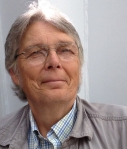 Jim Spates is Professor of Sociology Emeritus at Hobart and William Smith Colleges in Geneva, New York. He can be reached at jimspates43@gmail.com.
Jim Spates is Professor of Sociology Emeritus at Hobart and William Smith Colleges in Geneva, New York. He can be reached at jimspates43@gmail.com.
I have been working on John Ruskin for more than a quarter century, first introduced to him by a long-time colleague at Hobart and William Smith Colleges, Claudette Columbus, in the mid-1980s during a semester when we co-taught a course on “London in the Nineteenth Century.” Sociologist that I am, I wanted our students to read the giants in my field who not only had lived in London during that tumultuous time, but who had written works regarded as classics of social thought while they walked and talked there–Marx and Engels prime among these. While Claudette had no objection to including such celebrated thinkers, her list, given that she was a Professor of English and Comparative Literature with a specialty in 19th century English writers, was different. We would read some Tennyson and Browning, she said, some Dickens, some Carlyle, and some Ruskin. Delighted with the suggestion of the first four, I was forced to admit, a bit sheepishly, that I had no idea who this last fellow, Ruskin, was. She repied that, unfortunately, I wasn’t alone in my ignorance. Many were enveloped in the same darkness, a tragedy given the level of Ruskin’s genius and the depth of his thought on virtually every matter of significance in and for life.
Once I began to learn for myself how correct my colleague was, my intellectual life was transformed. For in this now-all-but-buried (formerly) eminent Victorian, I found what I had been looking for over the course of the more than two decades which had evaporated after I received my PhD–a sociologist (actually, a “proto-sociologist”) whose analytical brilliance was not only unsurpassed, but whose approach to social life, in contradistinction to most of those who call themselves sociologists these days (the majority of whom regard themselves as “objective, scientific reporters” for whom value judgments are anathema), was unabashedly moral. Like Plato, my other great mentor in thinking carefully about the nature of social life, Ruskin took it as axiomatic that the reason anyone studied society was that we might come to understand what forms of social arrangement were good for human beings and which were inimical.
I’ve never looked back, for soon I learned that Ruskin was about much more than social critique. Before his turn in that direction, he had been Britain’s most renowned art and architecture critic, the author of many books which had substantially transformed how people thought about these vital subjects; had been, as well, one of, if not the first, environmentalist, his love of nature causing him to react angrily against all those who were wantonly destroying our natural world as the Industrial Revolution marched in rough-shod books across the Western world. Then there was his abiding respect for everyone who worked, whether in high or low position, his belief that each person had something positive to offer for the betterment of the social whole, a view which became the core of our current, world-wide, Arts and Crafts Movement. To read Ruskin, in other words, is to learn much about all of the vital issues which touch our lives.
For anyone interested in learning more about this journey, my paper, “Why Ruskin?”–written to answer the question I have been asked hundreds of times since I first started down this remarkable path–can be downloaded on the Writing Ruskin Page on this website. If you’d prefer, you can request a bound copy by sending me an e-mail at the address noted above.
Also below is a link to my Curriculum Vitae, which, in this version, attends mainly to my Ruskin work. If you wish to be in touch about any aspect of it, send a note to the same e-address.
I hope you enjoy the excerpts from Ruskin’s works which are the raison d’etre of this site. For the last three decades and more they have enlighted me and bouyed me up, especially during those moments when the conundra of life have seemed to suggesst that nothing but tragedy and hopelessness are destined to reign on our troubled globe. In such moments, Ruskin can be for us, as he was for so many of his contemporaries, a tonic, a still-shining beacon directing us toward what Plato called The Good.
Write anytime about anything.

Pingback: John Ruskin | Inglenookery
This site looks wonderful. I have just discovered Ruskin. Thanks for this information. I need hope at this very difficult time in our nation. I look to the great thinkers, writers and artists of the past!
Mame